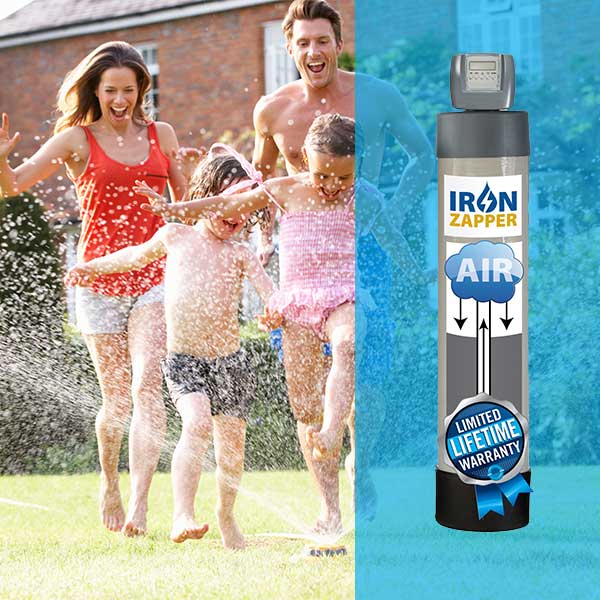Where does sulfur come from?
Sulfur comes from a variety of different organic matter and chemical reactions. The most common include:
- Decay of organic matter
- Chemical reactions soil and rock that contain sulfur
- Water heaters themselves
- Warm environments produce hydrogen sulfide gas which prompts the growth of sulfate-reducing bacteria
- Magnesium anode supplies electrons that sustain the reaction which creates hydrogen sulfide
How is it entering my water?
High levels of sulfur bacteria (also known as hydrogen sulfide) in your home’s water supply or plumbing system will cause that unpleasant smell you’re used to identifying as rotten eggs. Yet, the source is what you truly want to discover because that’s how you’ll fix it for good. Here are a few common locations that this issue arises.
- Hot water: If you notice that the rotten egg smell overwhelms you only when the faucet is dispensing hot water, then it’s likely a problem with your hot water heater. Make sure you test hot and cold individually and check for the smell with each type of water. If this seems to be the issue, you’ll need to contact your local plumber to service and repair your water heater. They may opt to use a concentrated chlorination treatment in the hot water heater (a temporary treatment) or select an impose current anode treatment to limit the proliferation of bacteria in the tank itself (a permanent solution).
- Treated water: If you noticed the smell of sulfur in both hot and cold water, your next step should be checking whether the issue with treated or untreated water. Sometimes untreated water doesn’t have an issue while treated water does, which means the issue lies with the water softener. Have this plumbing fixture serviced and repaired for an easy fix.
- All water: If all of your water is impacted (hot, cold, treated, untreated), then your problem lies within the water system itself. One key indication of this is when there are black stains on your silverware and plumbing fixtures in addition to the smell. This occurs when the hydrogen sulfide corrodes your pipes. To remedy this, call your local health department and notify them of the issue, so that they can have the water tested in a state certified laboratory. Your goal should be to see the levels of hydrogen sulfide, sulfate, sulfur, and iron bacteria. Once you understand the imbalance that is occurring, you can work to get it back in balance.
The problem with hydrogen sulfide
As you do research, you’ll likely come across the fact that – in most cases – sulfur is harmless. It smells unpleasant, discolors your food, and often impacts the taste of your food, but it isn’t harmful. So, does that mean that you can just let it go? If you can deal with the unpleasant smell and taste, then it’s fine, right? Wrong!
While low levels of sulfur won’t kill you, high levels can be bad for your health and cause serious illness. Therefore, it’s important to remedy this issue as quickly as you can once you begin to notice it. Why?
- Sulfur is a food and energy source for bacteria that live in soil. Then bacteria then produce hydrogen sulfide gas. By consuming sulfur through food and water in your home, you’re ingesting the waste of bacteria.
- Like any other mineral, sulfur is considered part of a healthy diet…in moderation. Too much sulfur in your drinking water can lead to uncomfortable symptoms like dehydration and diarrhea that can become life threatening (especially for people with weakened immune systems) if not taken seriously when they persist. In fact, if you’re at the point where you can taste the sulfur in your water, you’re already at the point where it will cause dehydration and diarrhea.
- Sulfur can cause damage to your plumbing, which may cause an emergency at an inconvenient time. It’s far better to remedy the issue when you have it under control than when you need to replace pipes and plumbing fixtures because they’ve been corroded by sulfur.
In sort, sulfur water won’t make you sick unless you have a high level. That said, if you’re tasting it in your water, you have high levels, which means it’s worth fixing if for no other reason than it can make you sick.
Reasons to fix sulfur water
- Diarrhea and dehydration: A high sulfate diet can have a laxative effect which subsequently causes dehydration. Yikes!
- Taste: The bitter taste of sulfur water isn’t anyone’s favorite.
- Laundry: If you’re noticing a change in your ability to laundry your clothes, it isn’t your imagination. Sulfates can reduce the power of bleach and make it more difficult to clean clothing.
- Pipe clogging: Sulfates often create a slime that clogs pipes and stains clothing. Yuck!
- Odor: The odor is likely what alerted you to the problem in the first place. You may be able to tolerate the smell of rotten eggs, but at what cost?
- Corroded metal: Hydrogen sulfide wears away at the metals that commonly make pipes (steel, copper, iron). This means that sulfur water can easily impact the lifespan of your plumbing system.
- Stained fixtures: Black and yellow stains in your bathroom are the results of sulfur water. It looks unappealing and may require you to replace fixtures earlier than you would otherwise.
- Tarnished utensils: A black tarnish is common on silverware when they’re washed with sulfur water. This can be a key sign when you’re first discovering the problem.
The simplest way to remove sulfur from your water
Looking for a simple way to remedy your water smelling like sulfur? Safeway Water has just the solution!
- Iron Zapper: This system helps to remove iron, hydrogen sulfide, and manganese from your water. It uses a natural catalyst to create an accelerated oxidation reaction and filtration layer to remove iron. Highly oxidized iron, hydrogen sulfide, and manganese particles result from this, and they now large enough for removable in a filter.
- Sulfur Shield Systems: These systems are designed to remove the hydrogen sulfide that is making your water smell like rotten eggs. Investing in a filtration system to remove it will make all the difference!
Final thoughts
Your water smells like sulfur water because organic matter or a chemical reaction is occurring somewhere in your water system. It may be in your hot water, treated water or your entire system, and you won’t know until you test it. However, once you do, there are numerous reasons it’s valuable to fix it (even if there are low levels!). From stained fixtures and utensils to greater plumbing and health issues, nip this issue in the bud as soon as you begin to notice it.


